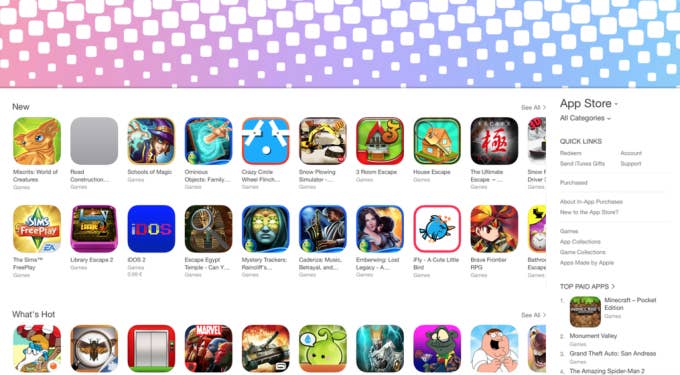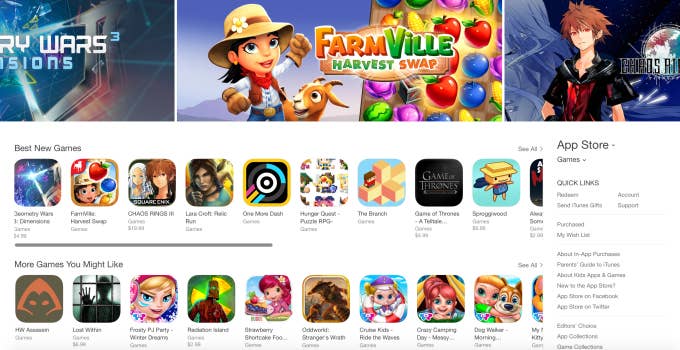The App Store is changing - for the better
"Apple's move shows that it is serious about reversing the race to the bottom, and putting companies that treat players like cattle in the back seat"
If you're a mobile game developer, virtually all of the revenue generated by your products will flow from two sources: the App Store and Google Play.
The dominance of these two retail platforms is so total - in Europe and North America at the very least - that even the smallest of changes can have huge and lasting ramifications for what will soon become the largest segment of the global games market. Apple's tweaks can materially affect the lives of thousands of game developers. Tweaks like those introduced to the US App Store this week. Tweaks that will soon become the new landscape in which all mobile game developers must operate.
Apple has removed algorithmically generated sections from the front page of the App Store, specifically the "New", "What's Hot?", and "All iPhone" lists. The alchemy of those algorithms is known only to Apple, of course, but download volume seemed to play a significant role. If a developer wanted to get a game featured on the front page, investing in a "burst" user acquisition campaign to boost download numbers was as close to a solid strategy as the chaos of the mobile games market would allow. That initial payment led to greater visibility, and therefore more downloads with a lower cost per install (CPI).
As noted by Eric Diepeveen, CEO of Stolen Couch Games, Apple has closed the door on that practice, swapping out those algorithms with good, old-fashioned subjective opinion. The vast majority of that all-important storefront is now occupied by curated lists from the App Store's editorial team. For some people attempting to build a business in mobile games, this extra layer of uncertainty can feel like a threat.
For Ian Harper, managing director of Future Game of London, the impact of this apparent move toward a more heavily curated App Store - a "good move" in his estimation - may not be as severe as it seems at first glance. The "Free" chart, for example, is still accessible to developers willing to pay for a burst campaign. Now, however, there is significantly more virtual shelf-space available that hasn't been influenced by paid user acquisition (UA).
"With Apple spending the extra time to highlight a list of 20 or so games they think are good, in every genre, every week, it's likely the changes will provide a better selection of games for consumers, rather than the space being used to mirror what's going on in the Free chart, which is still there anyway," Harper says.
"Burst campaigns might have had a positive short term impact, but were overall a poor strategy for long term success"
Nikola Cavic, Nordeus
"If Apple did want to reduce the effectiveness of burst marketing campaigns, they have simple algorithmic changes they could make to how the Free chart functions under the hood. For instance, the chart doesn't need to update so frequently: it could change daily, or even weekly like the music charts, in order to avoid peaks in hourly downloads from affecting the chart ranking much. They could factor frequency of app use after download into the ranking calculations, and many other things too."
Paul Virapen, CEO of the smartwatch developer WearGa, is also reluctant to define this shift as the death knell for burst campaigns as an effective strategy, again because of the Free chart. "And to put it quite simply," he says, "if your CPI is greater than your average lifetime value (LTV), regardless of any potential organic uplift you might get, then you probably shouldn't be acquiring users at all."
Whether this represents a calculated attempt by Apple to undermine the efficacy of strategies like burst campaigns is an open question. What's clear is that developers of every size, shape and model see this as a positive step, and hopefully the first of many toward a marketplace defined more by quality than scale.

"In the past, there have been cases of developers boosting (often mediocre) apps to the top of the App Store," says Jan Miczaika, COO of Wooga. "If Apple has started to editorially pick high-quality apps for the front-page, this could lead to a better consumer experience, which is ultimately good for all developers and the industry."
Nikola Cavic, head of business development at Nordeus, takes a similar view. With its hit football management sim Top Eleven, Nordeus principally relied on a high standard of execution leading to word-of-mouth recommendations for growth. The changes to the App Store simply lend more credence to that as the best available method for becoming a regular on the front page.
"This change is great for the industry," he says. "In particular, it's good for new, high quality games and how they are presented within the App Store. Burst campaigns might have had a positive short term impact, but were overall a poor strategy for long term success. Also, they would rely heavily on marketing spend that is usually not available to the vast majority of mobile game developers."
This is a crucial point. Anyone now pining for the old storefront is effectively nostalgic for a less democratic marketplace, one that inadvertently encouraged buying your way to success. According to Alex Nichiporchik, CEO of Tinybuild, should Apple be attempting to tip the balance in a more equitable direction, the worst affected companies probably won't require much sympathy.
"Bloated companies filled with people who make decisions based on charts will lose"
Alex Nichiporchik, Tinybuild
"It's been a long time coming," he says. "Apple has been trying to raise the visibility of quality content for as many people as possible via automated algorithms, but they just couldn't keep up with all the spam coming from these 'traffic acquisition'-powered companies.
"Apple's move shows that they're serious about reversing the race to the bottom, and putting companies that treat players like cattle on the backseat. Game developers who invest into great content, usability, and making players feel happy are the ones who will win here. Meanwhile, bloated companies filled with people who make decisions based on charts, without actually playing the games or being passionate about the industry, will lose."
And there could be another, more unexpected knock-on effect to this process. In an article published on GamesIndustry.biz back in March, Ivo Wubbels, managing director of Engine Software, questioned the wisdom of adopting the free-to-play model when return on investment (ROI) for the vast majority of developers was so poor. The iOS version of Engine's Proun+ costs £2.99, for example, and Wubbels believes changes like this would give greater exposure to developers who would rather avoid the precarious economics of free-to-play.
"This mostly has impact on the bigger companies that try to buy users. Probably this will affect advertising models and investment models," he says. "So it may be bad for the bigger free-to-play games. For Proun+ we used the premium model. I wouldn't be surprised if this change means more and more premium games will get the attention from Apple. This may actually be good for indie developers."

It could also be a positive step for mobile game developers in terms of how marketing resources are used. Burst campaigns are a relatively crude approach to building an audience; quick cash for a fast and tenuous return. Those strategies won't disappear altogether, but if they are no longer as effective it will push developers towards a broader variety of strategies, many of which won't require large investments of capital.
"Any marketplace needs to evolve and needs the right level of curation," says Saara Bergström, CMO of Next Games. "I think developers need to focus more on finding their players through a richer mix of marketing strategies and channels, rather than focusing solely on optimising against chart placement.
"It's good news, not great. Great would be a complete overhaul of the store page, front and back end"
Matthijs Dierckx, Sumico creatore
"I believe that in the future we'll see developers get a lot more creative with marketing, finding new avenues to reach potential players, which is great. Developers have to think about their product marketing more holistically. How to integrate elements worth talking about in their games and give players the means to share their experience. A lot of developers have paid more attention to telling stories and brand marketing in the mobile space recently, which gives more depth to the experience and engages players on a whole different level."
The fact that these changes provoked both pessimistic hand-wringing and cheerful optimism from within the same community of developers is testament to just how diverse mobile gaming has become. The long-standing problem has been the inability of the App Store to reflect and promote that diversity. This is a confident step towards a better and fairer system, but Apple could still do more for the developers that add so much value to the iPhone, the iPad, and very soon the Apple Watch.
"Reducing the influence of UA on visibility on the front-page is definitely important, but it's good news, not great" says Matthijs Dierckx, the developer of Sumico: The Numbers Game. "Good because it's a step in the right direction. Great would be a complete overhaul of the store page, front and back end.
"There's no transparent system in place for developers to pitch their game to an editorial board. Somehow Google nor Apple seem to be interested in this. Not the way Valve is, at least."
Image source: Techcrunch









